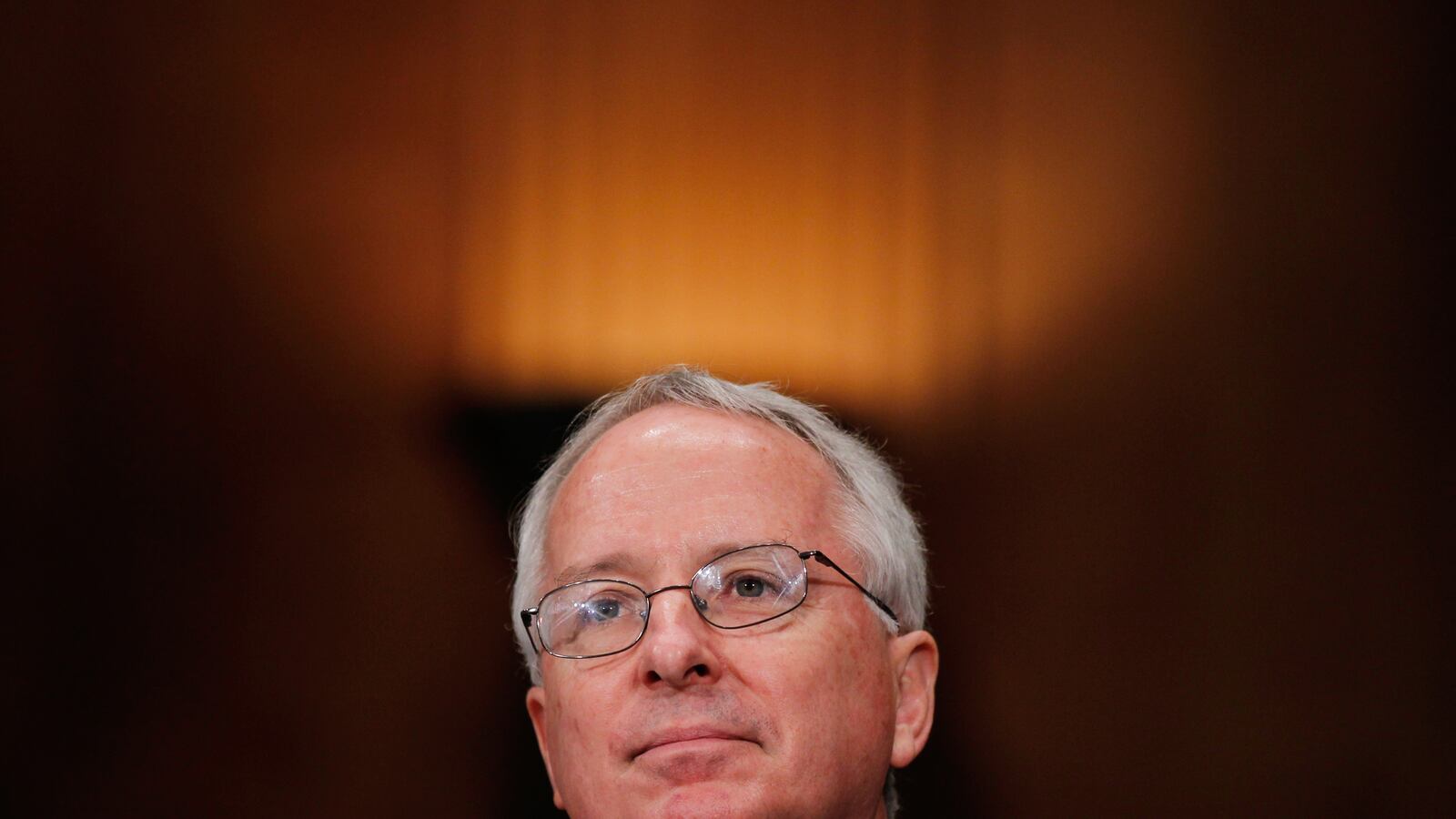Cameron Munter, the former U.S. ambassador to Pakistan, looked suntanned, but not rested, as he sat in a Foggy Bottom bar a few blocks from the State Department on a fall evening. He placed an Islamabad Golf baseball cap on the table, a souvenir from a decades-long career that had recently ended in a public flameout.

This past May, it was announced that Munter would be leaving his post. At the time, a State Department spokesman said he had made “a personal decision” to step down. But a few weeks after the announcement, The New York Times—in an article about counterterrorism policy—quoted one of Munter’s colleagues saying the ambassador “didn’t realize his main job was to kill people.”
That didn’t sound like the man I had met several months earlier at a party in Washington—back then, he seemed to relish his job as ambassador. I wondered why Munter’s colleague had said that, and I also wanted to know why he had resigned. He agreed to meet me at a bar to tell his side of the story, explaining that the Times had been wrong about him. It made him sound like a softie, he said, a mischaracterization that he wanted to correct.
Munter—who grew up in Claremont, Calif.—was no stranger to geopolitical hot spots even before he took the Pakistan job. He had been ambassador to Serbia from 2007 to 2009 and later served as deputy chief of mission in Baghdad.
It was Richard Holbrooke, then serving as special envoy for Pakistan and Afghanistan, who initially approached Munter about the ambassadorship to Pakistan. He arrived in Islamabad in October 2010; less than three months later, Holbrooke was admitted to a Washington hospital for heart surgery, and two days after that he was dead. “I miss him every day,” says Munter. “The only reason I took that damn job is because he talked me into it, and then he died.”
Holbrooke had handed off an important but tough assignment. For months, the Obama administration’s relations with Pakistan had been in steady decline. Instead of diplomacy, Washington was increasingly employing brass-knuckle techniques, such as threatening to cut back on aid. “When I get calls from the White House, they say, ‘Dial up the pain,’” Munter tells me. “In Islamabad, they don’t respond well to dialing up the pain.”
Soon, Americans and Pakistanis were fighting over the drone program, a contentious issue they had previously worked together on. And this would also become a major source of tension between Munter and Washington officials.
It wasn’t that Munter was against drone strikes. “We prevented major attacks,” Munter tells me. “To me, that’s my job, and I’m proud we did it.” He also thinks allegations that drone strikes kill civilians are trumped up. “We have people who bring us the bodies of little girls,” he says, stretching out his arms as if he were carrying a small corpse, “and say drones killed them. They’re making it up, or they’re willfully believing lies.”
What Munter did want, however, was a more selective use of drones, coupled with more outreach to the Pakistani government—in short, a bigger emphasis on diplomacy and less reliance on force. “What they’re trying to portray is I’m shocked and horrified, and that’s not my perspective,” he said, referring to The New York Times article. “The use of drones is a good way to fight the war. But you’re going to kill drones if you’re not using them judiciously.” Munter thought the strikes should be carried out in a measured way. “The problem is the political fallout,” he says. “Do you want to win a few battles and lose the war?”
“What is the definition of someone who can be targeted?” I asked. “The definition is a male between the ages of 20 and 40,” Munter replied. “My feeling is one man’s combatant is another man’s—well, a chump who went to a meeting.”
Munter wanted the ability to sign off on drone strikes—and, when necessary, block them. Then-CIA director Leon Panetta saw things differently. Munter remembers one particular meeting where they clashed. “He said, ‘I don’t work for you,’ and I said, ‘I don’t work for you,’” the former ambassador recalls. (George Little, a former CIA spokesman who is now at the Pentagon—where Panetta is currently serving as Defense secretary—disputed this account. “I’ve heard these rumors before,” he said. “That’s exactly what this is: rumor. [Panetta] has had productive relationships with Ambassador Munter and other ambassadors with whom he has worked.”)
The question of whether Munter should have had the ability to stop drone strikes was complicated. According to National Defense University’s Christopher Lamb, an ambassador has top authority at an embassy and should therefore be informed of CIA plans for covert action. And there is certainly precedent for this procedure. It is also true, however, that ambassadors historically have rarely objected to such operations when they are told about them.
That made what happened in March 2011 all the more extraordinary. That month, the CIA ordered a drone strike against militants in North Waziristan. Munter tried to stop the strike before it happened, but, according to the Associated Press, Panetta “dismissed” Munter’s request.
The timing of the strike was noteworthy: it was the day after CIA contractor Raymond Davis, who had shot two Pakistani men, was released from a Lahore jail. The fact that Davis had been detained for weeks reportedly angered the CIA. “It was in retaliation for Davis,” a former aide to Munter told the Associated Press, referring to the strike. (The CIA did not respond to my request for comment.) In the end, the strike killed at least 10 militants, and reportedly 19 or more civilians. And Munter wasn’t the only one who was upset. So were the Pakistanis: Gen. Ashfaq Parvez Kayani, the Army chief, said the men had been “callously targeted.” Rumors circulated that some of them were spies for the military, risking their lives to help fight the Taliban.
Following the strike, President Obama set up a more formal process by which diplomats could have input into these strikes. “I have a yellow card,” Munter recalled, describing the new policy. “I can say ‘no.’ That ‘no’ goes back to the CIA director. Then he has to go to Hillary. If Hillary says ‘no,’ he can still do it, but he has to explain the next day in writing why.”
It was a limited victory for Munter, but his relationship with Washington remained difficult. Munter says he got along with Panetta’s successor at the CIA, David Petraeus. Still, with Holbrooke gone, the ambassador lacked powerful allies in the administration, and even his friends used the word “arrogant” to describe him. Moreover, he did not get high marks as an administrator: an inspector-general report criticized the management of the Islamabad embassy, calling it “controlling.”
Yet insiders and outsiders agree that the main reason for his demise was not his personality, bossy or otherwise, but the fact that he was off message. “Munter’s argument was that it would be much better to engage Pakistan diplomatically rather than just to rely on pressure,” says Vali Nasr, who served as a senior adviser to Holbrooke and is now at Johns Hopkins University. “The real issue was that he was not on the same page as Washington.”
During our interview, Munter criticized the way White House officials approached Pakistan. “They say, ‘Why don’t we kick their ass?’ Do we want to get mad at them? Take their car keys away? Or look at the larger picture?” He leaned back in his chair and recalled his last National Security Council meeting: “The president says, ‘It’s an hour meeting, and we’re going to talk about Afghanistan for 30 minutes and then Pakistan for 30 minutes.’ Seventy-five minutes later, we still haven’t talked about Pakistan. Why? Because Pakistan is too fucking hard.”






